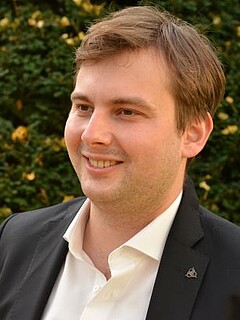PhD students 3rd cohort

Sigmund Jakob-Michael Stephan, M.A.
sigmund.jakob-michael.stephan@uni-jena.de
Curriculum Vitae
Oct. 2012-July 2017 BA in German Studies with a Minor in Philosophy | University of Freiburg (Thesis: The Motifs of the Botanic, Female, and the Child in Friedrich Schlegel’s Lucinde)
Sept. 2015-July 2016 Erasmus year at the University of Latvia
Aug. 2017-Aug. 2019 MA in Intercultural German Studies | University of Mannheim and University of Waterloo (Master Thesis: Towards a Posthumanist Ecozoo-poetics: Tawada’s and Kafka’s Creature Building)
Sept. 2019-August 2021 PhD in German Studies | University of Waterloo (Research interests: the role of animals in German 19th century aesthetics)
since Oct. 2021 PhD in German Studies | University of Jena/ Graduiertenkolleg Modell Romantik (Research interests: Comical Romanticism)
PhD project
Toward A Model of Comical Romanticism
Melancholy, longing, and despair are terms usually associated with Romanticism. Yet, comedy and humour were at the heart of the aesthetic project of Early Romanticism. In one of his first essays, Vom ästhetischen Werte der griechischen Komödie [1794], Friedrich Schlegel challenges Romantics to write a true comedy: “Nichts ist seltener, als eine komische Komödie. Das komische Genie ist nicht mehr frei, es schämt sich seiner Fröhlichkeit.“. According to F. Schlegel, humorous writers are unable to act out their jovial mood in a modern restrictive society. Romanticists; therefore, consider humour as a place where subjective autonomy can be experienced and realized.
Following Romantics’ revaluation of humour, my project shows that German Romanticism developed a distinctive form of humour. The model heuristic provides me with a high level of abstraction that allows me to capture the intersections between the heterogeneous theories and practices of humour at a certain period of time. I develop models of Enlightenment humour; thereby drawing on Johann Georg Sulzer's and Immanuel Kant's theories of laughter and Christoph Martin Wieland's Don Sylvio [1764] and Neuen Amadis [1771] to define Romantic humour as a discrete aesthetic phenomenon. By evincing the underlying premises of the Schlegel brothers' theories of comedy and Jean Paul's concept of humor, I outline a model of the “romantischen Komischen” (Jean Paul) or Romantic-Humour, which I illustrate and expand through literary case studies such as Ludwig Tieck’s Die Sieben Weiber des Blaubart [1797] and E. T. A. Hoffman’'s Die Königsbraut [1821] To conclude, I will expose the problems that Romantic-Humour has opened up by looking at post-Romantic debates on Romantic-Humour.
Romantic-Humour arises in texts that cognitively overtax and emotionally disorient the readers, without transgressing a playful mood. It does not aim to convey semantic meanings, but rather to create a jovial mood, which can be interpreted as a subjective strategy coping cheerfully with contingency. By doing so, Romantic-Humour facilitates an aesthetic experience of maximized autonomy that allows the readers to gain temporarily distance from all social, discursive and conceptual restrictions. In this respect, Romantic-Humour differs from Enlightenment models of humour that conceptualize humour in terms of means of moral improvement or as a therapeutic mood enhancer. Romantic-Humour continues to haunt autonomy aesthetic traditions of modernism, postmodernism, and contemporary heteronomous aesthetics by raising a pivotal question: How can a radical playful humour be social relevant without resorting to Enlightenment and Romanticism.
Publications
- „Simulierte Aleatorik als Verfahren des Romantisch-Komischen.“ Literarische Aleatorik Zur Form- und Rezeptionspoetik von Zufallstexten, Hg. Dana Steglich u. Jana Vijayakumaran, in Vorbereitung.
- „Warum zieht sich Peter Lebrecht aufs Land zurück? Das Dorf als Startpunkt der Romantik.“ Zeitschrift für Germanistik, Bd. 36, no. 3, 2024, S. 547-562, https://doi.org/10.3726/92175_547.
- „Warum verkörpert Zerbino das Romantisch-Komische?: Und was ist das Romantisch-Komische?.” Modell Romantik: Variation - Reichweite - Aktualität, 2023, doi.org/10.22032/DBT.59080.
- „Rezension von Heinrich Detering: Menschen im Weltgarten.“ Focus on German Studies, Bd. 28, 2021, https://doi.org/10.34314/FOGS2021.00001
- „The Early Romantic Comedy of Aesthetic Disobedience.” Oxford German Studies, Bd. 50, no. 3, 2021, S. 350 – 364, https://doi.org/10.1080/00787191.2021.1958573
- „Das Fundament der Einfühlungsästhetik: Smiths und Herders Rhetorik.“ Narthex: Heft für radikales Denken, Bd. 5, 2019, S. 30-35
- „Helene (Heese) Toews (1893-1983). A Mennonite Woman’s Story About Doubt and Leadership.” Mennonite Ontario History, Bd. 3, no.1, 2019, S. 4-7, 2019.
Presentations
- „E.T.A. Hoffmanns ‚Königsbraut‘ als Modell Reiner Komik.“ Hoffmanns Novellistik, Mannheim, Mannheim, 20.10.2023.
- „The Early-Romantic (Re)invention of the ‘Aleatoric Comical’.” Chaos, Unverbundenheit, Kombination. Aleatorische (Nicht-)Formen und ihre Rezeption, Antwerpen, 17.3.2023.
- „Warum zieht sich Peter Lebrecht auf Land zurück? Das Rurale in Tiecks Modellierung humoristisch-romantischer Autorschaft.“ Workshop Rurale Romantik, Berlin, 2.2.2023.
- „The Birth from Early Romanticism from Incurable Schwärmerei.” 46. Jährliche Konferenz der German Studies Association, Houston, 18.9.2022.
- „Towards a Social Theory of The Comical: Romantic Ironism.” PhD Conference on Romantic Philosophy, Aarhus, 2.4.2022.
- „The Ecopoetics of Uexküll’s Umweltlehre.”45. Jährliche Konferenz der German Studies Association, Indianapolis, 2.10.2021
- „The Decolonizing Dialogue between Garlieb Helwig Merkel and Early Latvian Nationalists.” Jährliche Konferenz der Canadian Association of University Teachers of German, Edmonton, 31.5. 2021.
- „When Species Meet and Talk at the Fringe.” Animal/Language: An Interdisciplinary Conference. Texas Tech University, Lubbock, 23.3.2019